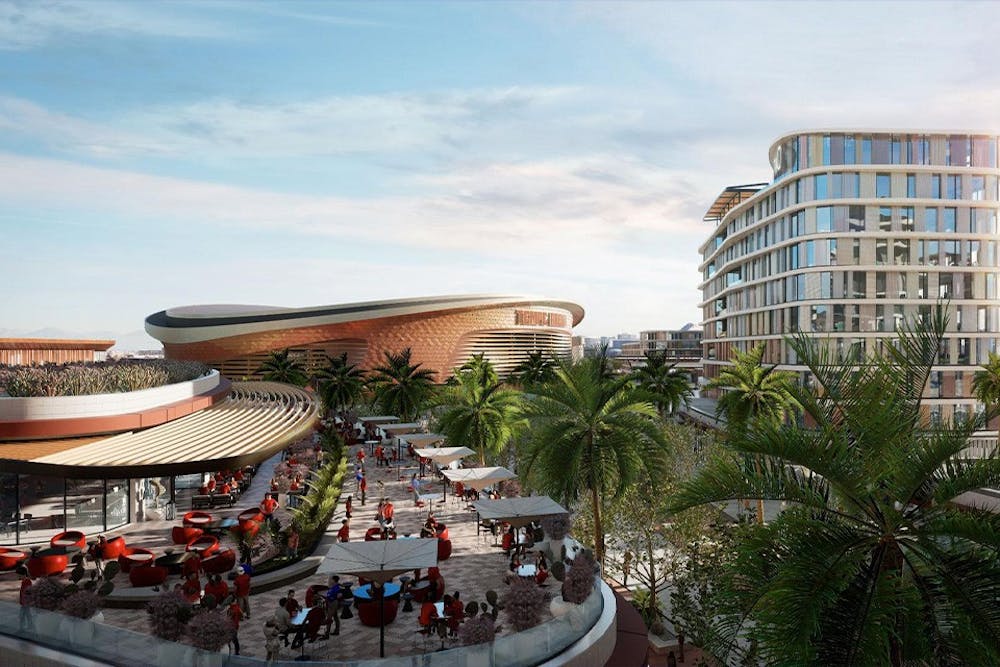Students are campaigning and mailing back their ballots in the ongoing special election for an arena that would host the Arizona Coyotes and a proposed entertainment district.
Four student groups signed a joint statement on the three propositions that are on the special election ballot. The statement, signed by the Arizona Students Association, United Campus Workers Arizona, Young Democrats and Young Democratic Socialists of America was given to The State Press in an email.
The proposed entertainment district would include nearly 2,000 apartments and a new hockey arena for the Coyotes with 16,000 seats on more than 46 acres with other businesses and retail locations. The groups have three main reasons Tempe residents should vote no — Tempe is in an affordable housing crisis, Arizona is in a historic drought and dealing with a water shortage and Tempe can't be the next city to enter into a deal with Coyotes owner Alex Meruelo.
READ MORE: Tempe special election for Arizona Coyotes arena and entertainment district, explained
"We urge our communities to vote 'no,' sending Tempe City Council back to the drawing board where they can solicit community input and initiate a new Request for Proposals process that better aligns with our needs and values," the statement said.
Francesca Martin, a freshman studying political science and volunteer coordinator with Tempe 1st, a a political action committee opposed to the propositions, said no Tempe resident should want to bring something to the community that they likely won't benefit from. Martin said the project seems to have had no public input until now.
READ MORE: Opinion: Five reasons to vote no on Tempe entertainment district propositions
In a column published by the Arizona Republic, three state senators who represent the Tempe and Mesa areas directly affected by the development asked Tempe voters to vote "no." Democratic state Sens. Mitzi Epstein, Juan Mendez and Eva Burch wrote that "A tax dollar-subsidized sports arena and embattled luxury housing aren't among residents' priorities, and they're not an appropriate use of our limited resources."
Kyle Schermerhorn, a junior studying public service and public policy and registered Tempe voter, works as a volunteer for the Tempe Wins campaign, a political action committee in favor of the entertainment district's development urging Tempe residents to vote yes on all three propositions. He's done door-to-door canvassing, called voters and has attended news conferences hosted by the campaign.
The entertainment district would provide stability for the Arizona Coyotes, Schermerhorn said. As a fan of the team for a long time, he said bringing the team to Tempe would centralize the location for fans who live in the East Valley, as downtown Phoenix hosts the Arizona Diamondbacks and the Phoenix Suns. Glendale would remain hosting the Arizona Cardinals. The Coyotes have played in ASU's Mullett Arena since October 2022 and Schermerhorn said a permanent home for the team is "long overdue."
As a public service and public policy student, he said working with Tempe Wins on a campaign in real-time while the special election is underway has been a good experience. He said connecting students to the election has been difficult because not every ASU student is a Tempe resident or Tempe voter. He said students who can vote should "take everything into account" and remember there may not be another development project like this one in the near future if voters let this opportunity pass them by.
"There's always costs to development," Schermerhorn said, listing issues like the environment, affordable housing and other economic stimulation brought on by business with the caveat that it's difficult to predict the arena's impact because the project hasn't been approved.
READ MORE: Conflicting economic analyses of Tempe entertainment district surface ahead of vote
Nia Amazeen, faculty advisor for YDSA, UCWA organizing committee member, Tempe resident and an ASU professor of psychology, said the back-and-forth in the buildup to the special election has "turned residents against each other." She said the project would represent a significant wrong turn for the city after years of council consulting residents, welcoming feedback and having open-door conversations about the goings-on for the future.
"They came in with a plan and money to promote their perspective," Amazeen said. "This was a top-to-bottom, not bottom-up decision."
Amazeen said students have a lot of stressors and worries already, including housing, food security, climate change on top of academic pressure and personal conflicts. No matter what happens or what the results of the election are, Amazeen said the effects will continue to trickle down to students who are already facing, and continue to face, rapid growth around them.
Edited by Shane Brennan, Jasmine Kabiri and Grace Copperthite.
Reach the reporter at pjhanse1@asu.edu and follow @piperjhansen on Twitter.
Like The State Press on Facebook and follow @statepress on Twitter.

Piper Hansen is the digital editor-in-chief at The State Press, overseeing all digital content. Joining SP in Spring 2020, she has covered student government, housing and COVID-19. She has previously written about state politics for The Arizona Republic and the Arizona Capitol Times and covers social justice for Cronkite News.




